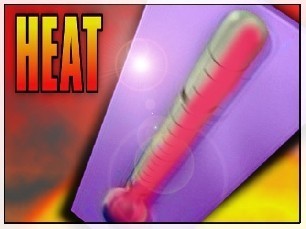Dress for the heat. Wear lightweight, light-colored clothing. Light colors will reflect away some of the sun's energy. It is also a good idea to wear hats or to use an umbrella.
Drink water. Carry water or juice with you and drink continuously even if you do not feel thirsty. Avoid alcohol and caffeine, which dehydrate the body. Avoid using salt tablets unless directed to do so by a physician.
Eat small meals and eat more often. Avoid high-protein foods, which increase metabolic heat.
Slow down. Avoid strenuous activity. If you must do strenuous activity, do it during the coolest part of the day, which is usually in the morning between 4 and 7 a.m.
Stay indoors when possible. If air-conditioning is not available, stay on the lowest floor out of the sunshine. Remember that electric fans do not cool, they simply circulate the air.
Be a good neighbor. During heat waves, check in on elderly residents in your neighborhood and those who do not have air conditioning.
Learn Red Cross first aid and CPR.
*Know What These Heat-Related Terms Mean:
Heat cramps: Heat cramps are muscular pains and spasms due to heavy exertion. Although heat cramps are the least severe, they are an early signal that the body is having trouble with the heat.
Heat exhaustion: Heat exhaustion typically occurs when people exercise heavily or work in a hot, humid place where body fluids are lost through heavy sweating. Blood flow to the skin increases, causing blood flow to decrease to the vital organs. This results in a form of mild shock. If not treated, the victim may suffer heat stroke. Signals of heat exhaustion include cool, moist, pale flushed or red skin; heavy sweating; headache; nausea or vomiting; dizziness; and exhaustion. Body temperature will be near normal.
Heat stroke: Also known as sunstroke, heat stroke is life-threatening. The victim's temperature control system, which produces sweating to cool the body, stops working. The body temperature can rise so high that brain damage and death may result if the body is not cooled quickly. Signals include hot, red and dry skin; changes in consciousness; rapid, weak pulse; and rapid, shallow breathing. Body temperature can be very high-sometimes as high as 105 degrees.
*General Care for Heat Emergencies:
Heat cramps or heat exhaustion: Get the person to a cooler place and have him or her rest in a comfortable position. If the person is fully awake and alert, give half a glass of cool water every 15 minutes. Do not let him or her drink too quickly. Do not give liquids that contain alcohol or caffeine. Remove or loosen tight clothing and apply cool, wet cloths, such as towels or sheets. Call 9-1-1 or the local emergency number if the person refuses water, vomits or loses consciousness.
Heat stroke: Heat stroke is a life-threatening situation! Help is needed fast. Call 9-1-1 or your local emergency number. Move the person to a cooler place. Quickly cool the body. Immerse victim in a cool bath, or wrap wet sheets around the body and fan it. Watch for signals of breathing problems. Keep the person lying down and continue to cool the body any way you can. If the victim refuses water or is vomiting or there are changes in the level of consciousness, do not give anything to eat or drink.

http://accesswdun.com/article/2012/7/250154
